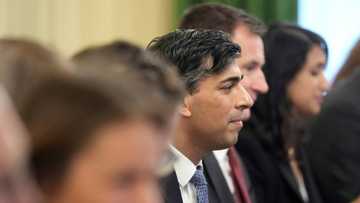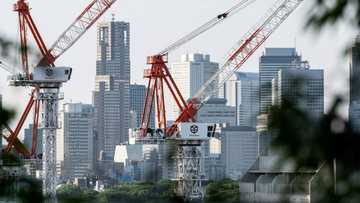Inflation, higher rates hit eurozone growth outlook

Source: AFP
The European Commission on Wednesday lowered its eurozone growth forecast for 2023 and 2024, saying the high cost of living and interest rates were weighing on consumers and businesses.
It revised its 2023 growth forecast to 0.6 percent, shaving off 0.2 percentage points from a previous estimate. Growth in 2024 was put at 1.2 percent, a 0.1-point downgrade.
"Still high, though declining, inflation, and tightening monetary policy took a heavier toll than previously expected," the commission said in a statement, referring to European Central Bank interest rate hikes aimed at taming consumer prices.
External demand was also weak, it said.
The eurozone's economic prospects contrasted with that of the United States, which is experiencing robust annualised growth of 4.9 percent based on third-quarter data.
Both Europe and the United States are grappling with persistently high inflation, triggered by the post-pandemic ramping up of demand and, in Europe's case, exacerbated by higher energy costs resulting from Russia's war in Ukraine.
PAY ATTENTION: Let yourself be inspired by real people who go beyond the ordinary! Subscribe and watch our new shows on Briefly TV Life now!
Brussels sees 5.6 percent inflation for the eurozone this year, unchanged from a previous estimate, and 3.2 percent next year, a mark up from the 2.9 percent previously forecast.
The European Central Bank, like the US Federal Reserve, has successively hiked key interest rates and looks set to keep them high through next year in an effort to rein in inflation.
The tight monetary policy is acting as a dampener on economic activity, especially apparent in the 20-nation eurozone.
"We are approaching the end of a challenging year for the EU economy, in which growth has slowed down more than expected," the EU's economy commissioner, Paolo Gentiloni, said.
"Strong price pressures and the monetary tightening needed to contain them, as well as weak global demand, have taken their toll on households and businesses."
'Lost momentum'
Gentiloni said the eurozone has "lost momentum" after a strong post-pandemic showing in 2021 and 2022.
"Real GDP barely grew in the first three quarters of this year," he said and was only expected to "rebound mildly" in coming quarters.
Global developments with potential to roil world energy markets -- particularly the case of the Israel-Hamas conflict that could spread in the oil- and gas-rich Middle East -- presented "downside risks," Gentiloni said.
"Heightened geopolitical tensions have further increased the uncertainty and risks clouding the outlook," he said.
Europe's economic sluggishness has fed through to the services sector after bringing industry activity down, and the outlook is gloomy with depressed demand and shortages of material and equipment.
"The latest October data from our surveys indicate some stabilisation in sentiment –- at a low level," Gentiloni noted.
"Over the next two years, private consumption is set to be the key growth driver, as wage increases should outpace inflation, lifting households' purchasing power," he said.
The eurozone's biggest economy, Germany, was expected to contract by 0.3 percent this year before seeing a "moderate rebound" to 0.8 percent growth next year and 1.2 percent in 2025, the commission said.
France, the number two economy, was forecast to post 1.0 percent growth this year, 1.2 percent next year and 1.4 percent in 2025.
PAY ATTENTION: Follow Briefly News on Twitter and never miss the hottest topics! Find us at @brieflyza!
Source: AFP




